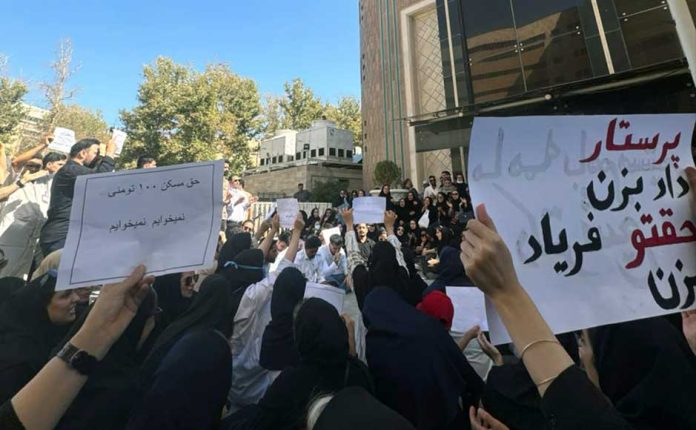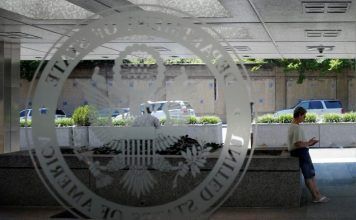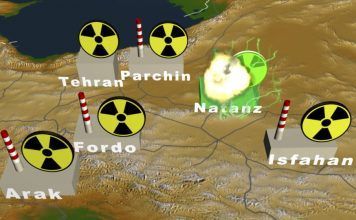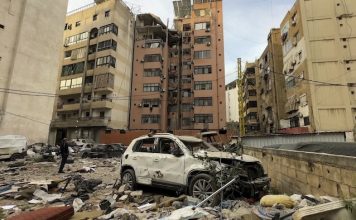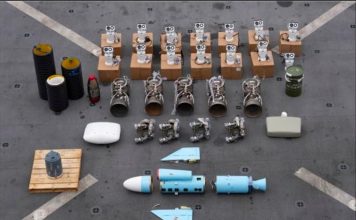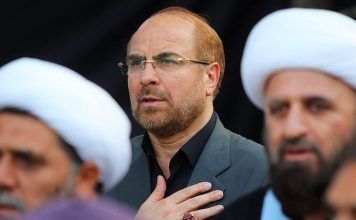By Kayhan Life Staff
A strike by Iranian nurses started three weeks ago in various cities nationwide and has now reached the capital, Tehran. Hundreds of nurses in state hospitals have joined the strike across a dozen provinces.
This strike is significant for several reasons. Crucially, it marks the first time in Iranian history that nurses have held a nationwide strike. In addition, the industrial action by nurses — typically regarded as part of the middle class — signifies a new phase in nationwide strikes, which have traditionally been led by workers, retirees, and teachers earning minimum wage.
Several factors have led to the nationwide industrial action. Currently, the salary for nurses in Tehran is approximately $220 per month, while in other major cities across Iran, it stands at around $200.
The bonus is another component of their earnings, which nurses report to be approximately $3.83 monthly. According to official figures, nurses’ overall income falls below the poverty line of $533 per month for a household in Tehran. This calculation is based on the current exchange rate of 595,000 rials to one U.S. dollar.
Nurses at state hospitals have been spearheading nationwide strikes in various cities across the country for over three weeks. They have also been organizing protests through gatherings for an extended period.
In a new and unprecedented wave of demonstrations, following several hours of rallies and protests in Bandar Abbas (in the southern province of Hormozgan), Fasa (in the south-central province of Fars), and Karaj (in the northern province of Alborz), nurses from multiple government hospitals in Shiraz (Fars province) started a simultaneous strike on Aug. 3.
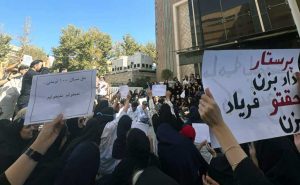
The action quickly gained momentum among nurses in other hospitals and spread to several additional cities, ultimately reaching Tehran.
Many nurses are on strike across over 50 hospitals in 10 provinces of Iran. There is a growing expectation that this strike may expand in the upcoming days if the Ministry of Health and Medical Education does not address the situation.
The cities and several provincial capitals currently experiencing a nurses’ strike include Shiraz, Fasa, Karaj, Bandar Abbas, Isfahan (in the central province of Isfahan), Tehran, Kermanshah (in the northwestern province of Kermanshah), Dehdasht (in the southwestern province of Kohgiluyeh and Boyer-Ahmad), Marivan (in the western province of Kurdistan), Tabriz (in the northwestern province of East Azerbaijan), Rasht (in the northern province of Gilan), Ahvaz (in the southwestern province of Khuzestan), Yasuj (in Kohgiluyeh and Boyer-Ahmad), and Ghazvin (in the northwestern province of Ghazvin).
The protesting nurses shouted various slogans, including: “Nurses, speak out and demand your rightful wages,” “No more empty promises; our tables are bare,” and “Where is our tax money? It is in your pockets,” “Unity against poverty and corruption,” and “We battled COVID-19 but received no support.”
The security forces, who confronted the protesting nurses, were reminded that they might need medical help someday, with the chant, “Police, you’ll end up in a hospital too.”
The nurses’ strike has occurred despite a repressive “Harasat” (an embedded security department within state institutions and organizations) in state hospitals. Nurses have successfully organized a strike of such magnitude that it resulted in the cancellation of certain surgeries across various hospitals while contending with pressures and threats from the security personnel assigned to these facilities.
According to various union representatives, security forces and hospital administrators are intensifying their efforts to end the nurses’ strike. In turn, the nurses, whose protests and demands have primarily gone unacknowledged by the authorities, have now taken action to assert their rights.
Mohammad Reza Sharifi-Moghaddam, the Secretary-General of the Nursing House (nurses’ union), alleged that hospital administrators and in-house security departments have used intimidation and threats to end the ongoing nurses’ strike.
“Nurses know their strike could lead to them losing their jobs. However, they have remained steadfast despite these threats, showing that the situation has escalated to a point where nurses no longer fear being fired for participating in the strike,” Sharifi-Moghaddam said.
In-house security personnel and hospital administrators have reportedly used a psychological strategy targeting nurses with threats, intimidation, and arrests. They are hiring students and recent graduates lacking practical nursing experience to fill positions in hospitals instead of utilizing striking nurses.
While this approach aims to intimidate and pressure the nurses, jeopardizing their job security, it ultimately endangers patients’ lives.
The determination of nurses over the past two weeks in the face of many threats has resulted in their arrests and the start of legal proceedings against them. According to activists from the nurses’ union, several nurses have been detained during the strikes in Arak (in the north-central province of Markazi) and Tehran over the last two days.
The disparity in salary is one of the critical issues nurses raise, as doctors in public hospitals earn considerably more than nurses. Conversely, nurses argue that specific tasks they perform, including changing dressings or sutures, are often assigned to doctors.
A report published last March by Kayhan London highlighted that nurses’ wages in Iran are significantly lower compared to those in other countries, both regionally and globally. Specifically, each nurse’s compensation for one hour of overtime work ranges from $0.30 to $0.50. This amount seems unreasonable and almost absurd, even without comparing wages in other nations.
In Malaysia, a country with relatively low wage levels, nurses earn 1.5 times their regular hourly wage for each hour of overtime, amounting to approximately $10 per hour.
In contrast, in the United Arab Emirates (UAE), nurses are compensated at $40 per hour for their standard work. If they take on overtime, their pay increases by 25 percent to 50 percent per hour, resulting in total earnings of up to $60 for each hour of overtime.
In Australia, an alternative immigration destination for Iranian nurses, weekday overtime pay is 1.5 times the standard hourly wage for the initial two hours and doubled for any additional overtime hours. The typical hourly wage for a nurse in Australia is approximately $40.
In Germany, nurses receive overtime compensation that ranges from 25 percent to 50 percent above their regular pay, with a minimum hourly wage of at least 18 euros (approximately $21.)
In an interview with the Tehran-based Etemad Online news website on Aug. 31, nurses’ union representative Sharifi-Moghaddam noted that nurses in Iran earn approximately $200 monthly.
“In Germany, a nurse starts with a monthly salary of $2,000. This figure rises to $4,000 monthly in several European nations, while nurses earn approximately $5,000 monthly in the U.S. and Canada. This comparison highlights a significant disparity,” explained Sharifi-Moghaddam.
One of the primary objectives for nurses is to enhance their earnings, which can be accomplished through measures such as enacting the Nursing Tariff Law, restoring previously abolished bonus systems, creating a “special payment system” with a multiplier of 3, and increasing the housing allowance reflected in their paychecks.
The Majlis (Iranian Parliament) ratified the Nursing Tariff Law in 2007, but its implementation did not occur until 2021. After a 15-year delay, this law was enacted during the final weeks of President Hassan Rouhani’s second term; however, nurses are still awaiting its complete execution.
The Nursing Tariff Law specifies the fees that hospitals and clinics can charge patients for nursing services. Enforcing the law will raise the tariffs for nursing services, ultimately increasing nurses’ income.
Currently, a fee of $4.5 is charged for 24-hour nursing group services provided to a single patient. This fee encompasses morning, evening, and night nursing care, senior nursing and rehabilitation services, and healthcare and supervision.
Because of the shortage of nurses, particularly following the COVID-19 pandemic, mandatory overtime for nurses has become a prevalent issue in government hospitals. Compensation frequently does not meet legal standards of fairness and compliance.
Also, the regulations regarding challenging and hazardous occupations, the option for nurses with 20 years of service to retire, considerations for seasonal holidays, and reduced working hours because of factors like weather or religious events like “Ramadan” do not apply to this group.
These instances illustrate the challenges faced by nurses. Recently, the strikes organized by this group have garnered significant public attention. Their unresolved demands and rights issues have led to a substantial outflow of nurses, with estimates suggesting that over three thousand cases occur annually.
Under these conditions, nurses have taken to striking, and according to Sharifi-Moghadam, they acknowledge that many of them may lose their jobs because of the strike. In recent months, some nurses have gone on strike because of the intense workload characterized by long shifts and mandatory overtime.
This situation has led several nurses to attempt suicide, while others have succumbed to “Karoshi” syndrome. Karoshi is a term that originated in Japan and refers to death caused by overwork and extreme occupational stress.
Nurses, particularly those in specialized care and emergency departments, say they have often served as the “punching bags” for patients, doctors, and ward supervisors despite challenging and stressful working conditions.
Concurrently with a recent nurses’ strike, a 30-year-old nurse in the western province of Lorestan was assaulted and threatened with death by a patient’s relative, who choked her and caused injury to her neck.
It remains to be seen how the new government and Health Minister Mohammad Reza Zafarghandi plan to address the crisis stemming from the nurses’ strike within the nation’s healthcare system and persuade the striking nurses to return to work. Regardless, the government may struggle to meet all the long-term demands put forth by the nursing staff.
To address nurses’ challenges, the Ministry of Health needs a substantial increase in funding for wage parity and higher earnings. Also, it requires recruiting tens of thousands of nurses to ease the existing workforce shortage, thus preventing current nurses from enduring extended shifts and compulsory overtime. However, accomplishing both objectives is unfeasible under the country’s present political and economic circumstances.
Meanwhile, Iran’s healthcare system loses thousands of nurses annually because of emigration. According to the head of the Nursing Organization of the Islamic Republic of Iran, the medical nursing sector is experiencing a deficit of over 100,000 nurses.
International guidelines recommend a staffing ratio of four nurses for every hospital bed within the healthcare system. The Ministry of Health has acknowledged a standard of 2.5 nurses per bed; however, current statistics show that in Iran, the actual ratio stands at only 0.9 nurses for each hospital bed.
In this context, nurses’ protests and strikes will probably continue and recur in the upcoming months. Also, a well-structured and effective network has been formed to facilitate the coordination of demonstrations and strikes within the nursing profession.
In the past, labor unions and independent networks advocated for protests among workers at several major factories, including Khuzestan Steel Company, Isfahan Iron and Steel Company, and Haft Tappeh Sugarcane Agro-Industry Company. This movement also encompassed contract and official workers in the oil sector, teachers, and retirees.
The strengthening of independent nationwide networks and the organizing of protests and strikes pose a threat to the Islamic Republic regime. As a result, in recent days, state media and analysts have attempted to portray the mass strike of nurses as merely a “trade union” issue, asserting that it is unrelated to “political” protests.
However, as the current situation persists, organized union protests are increasingly associated with demands for political reform. To counter this linkage, the Islamic Republic must implement measures it has thus far failed to execute, leading to the emergence of protests and strikes.

